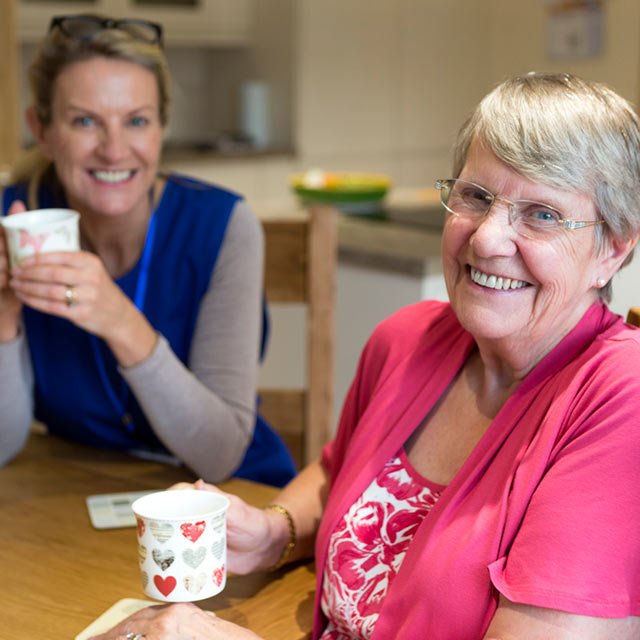The Practical Parkinson's Caregiver: 7 Things to Make Your Life Easier

When your loved one is diagnosed with Parkinson’s, it can throw your life into a whirlwind of change. You’ve now become a caregiver — but that’s not a role anyone is instantly geared up for.
“Some [partners or spouses] seem like they are born to be caregivers, and some are just not. Then, there are all the people in between who need to learn and come to grips with the job,” says Ted Dawson, M.D., Ph.D., director of the Institute for Cell Engineering at Johns Hopkins.
Learning to care for someone with Parkinson’s takes time, and what you do as a caregiver will change as the disease progresses. While taking care of your loved one is a very high priority, it’s not your only priority. You have to care for yourself too, says Dawson. “You need respite, to get out of the house, to see friends. No one should be caregiving 24/7.”
So how do you do that? Here are seven ways from experts at the Johns Hopkins Parkinson’s Disease and Movement Disorders Center to start as and stay a good caregiver without losing yourself in the process.
Adapt to the Diagnosis
An essential first step is coming to terms with the diagnosis and understanding that Parkinson’s disease is progressive. That means it changes over time, and your role changes with it.
Another important focus in the early days is to consider, along with your loved one, how to share the diagnosis with others so you can prioritize your needs. Don’t shy away from being honest with your family.
Talk to an Experienced Caregiver
It can be helpful to you, as well as your loved one and close family members, to connect with a seasoned caregiver. This person, whom you may find through your doctor’s office or at a support group (see Educate Yourself, below), has gone through similar things you’re facing at different times.
Experienced caregivers can provide reassurance and tried-and-true strategies for everything from making sure medications are taken, to recommending classes that have been helpful, to suggesting products that make a patient’s life easier. A trusted person who’s a step or two ahead of you can also show you by example that the condition can be effectively managed, and it generally progresses slowly.
Educate Yourself
Learn all you can about the disease early on so you can be your loved one’s advocate in his or her health care, and you can make informed decisions together. The National Parkinson Foundation has a number of free educational materials you can order. For example, it offers a booklet called Caring and Coping that is a good starting point for caregivers.
Joining a support group may not seem immediately necessary, especially if your loved one is in an early stage, but it’s a good idea because people in a group may be at later stages than you and can help you navigate changes and challenges.
Contact the National Parkinson Foundation helpline at 800-4PD-INFO or [email protected]. You can also ask your doctor’s office for referrals.
Establish a Network
Right now, you may feel that it’s no problem to handle everything yourself, from managing doctors’ appointments and scheduling medications to taking on more responsibilities at home. But that can change, sometimes quickly.
That’s why getting a support system in place — children, relatives, friends and neighbors, religious and community groups — early is best.
Be honest about the fact that even if you’re not reaching out today, you may be down the line.
Get Adult Children Involved
Many times, caregivers are reluctant to ask too much of their grown children, not wanting to burden them, especially if they are in the midst of raising their own families. But that does both you and your offspring a disservice.
Your children should understand the nuances of the disease and share as much as they can in their parent’s life. Adult children can and should be providing you, the caregiver, with days off from caregiving now and then.
Depending on the stage of the disease, that can mean taking the parent to the child’s home for a day or enjoying outings, like a trip to a museum or sporting event. That gives you a day to enjoy yourself or take care of personal errands, and gives your loved one and his or her grown child time to bond.
Make Time for Fun
As much as you can, continue to do all the things you have always enjoyed. Find time for your book club, swim class or lunch with a friend. Maintaining your identity as someone apart from your role as a caregiver is important for your mental and physical well-being.
Don’t Neglect Your Health
Many aspects of caring for a loved one are stressful, and if your own stress level is ratcheting up, you need to step back and get help for yourself. Keep up with regular physical checkups and follow your doctor’s advice if you need treatment for any ailments. And don’t make a habit of putting off important tests for the sake of your loved one.
This care includes your mental health. If you begin to have feelings of intense frustration, talk to your doctor; there are probably treatments that can help. And consider respite care or home help if you can’t get family and friends involved.




